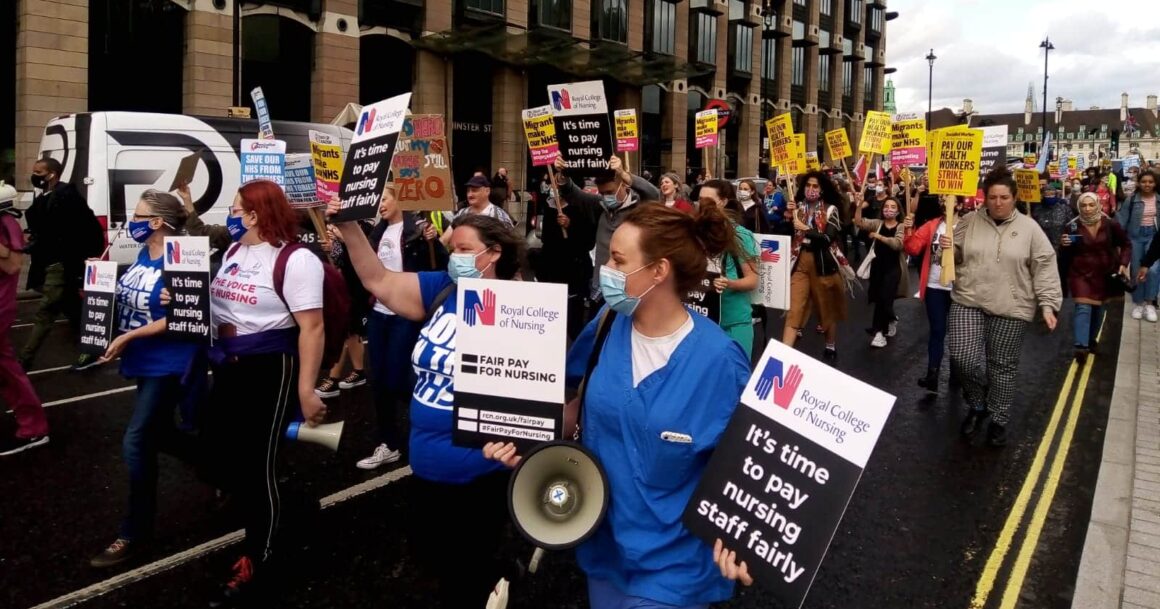

Just a year ago, Tory ministers were applauding nurses, doctors, and cleaners as heroes and using “Save Our NHS” as a key slogan to inspire the fight against covid-19.
Now they are offering one million NHS staff a 3% pay raise when inflation is running at 3.9%. After decades of decline in real incomes, their “reward” is in fact a pay cut, equivalent to a £200 real-terms reduction according to the Royal College of Nursing.
This comes at a time when there are 90,000 vacancies in NHS England alone and staff are stretched to breaking point after over a year of work in pandemic conditions.
Moreover, the pay rise will come out of the existing NHS budget so that if staff demand more, the media can easily transform them into selfish villains taking money away from patient care.
True, the current offer is an improvement from the previously promised 1%, a reversal forced by an immediate public outcry. But even this inadequate proposal is riddled with loopholes.
Only half of the pay rise is a permanent increase, while the other half is a one-off payment. Outsourced NHS staff, including cleaners and porters, will be excluded from the offer, as will 61,000 junior doctors who make a up a significant proportion of hospital medics. Many other key workers essential to patient care, including the entire social care workforce, are being subjected to a pay freeze.
After a year-long spending spree forced on the government by the pandemic, it seems that the old dictum that “there is no magic money tree” is about to reappear.
No meaningful support will be forthcoming from the Labour leadership, who previously called for a 2.1% increase, and were outflanked by the Tories’ final offer! The best that shadow health minister Justin Madders could muster in response to the government U-turn was that “the government must make our NHS and key workers feel supported and valued after all they have done for us.”
Rank-and-file health workers are campaigning for a 15% pay rise, an amount which would begin to reverse the erosion of real-terms pay through inflation and freezes since 2010. This claim is completely justified given more than a decade of austerity, and is even reinforced by some of the health unions’ official claims.
Unite is calling for 15% or £3,000, whichever is greater, the GMB for 15% or £2 on the hour, the RCN for 12.5% and Unison – bringing up the rear as usual – for £2,000 for all pay grades, which amounts to 8% for the lowest paid.
How to Win
Past experience shows only industrial action or the genuinely credible threat of it will make this government back down.
The RCN has made a good start – its members in Scotland have already rejected a 4% offer from the devolved Scottish government, and the union nationally has set aside £35m to cover the costs of a potential strike. It is also training 25,000 “workplace activists” to help win any forthcoming strike ballot. Pat Cullen, the acting general secretary, has said: “The profession will not take this lying down. We will be consulting our members on what action they would like to take next.”
But victory will require a united front between all the health unions, who should collectively reject the current offer and unify their pay claims at 15%.
To force the government’s hand, the unions will need to conduct national ballots for action and empower workplace activists to take charge of it in order to win.
The NHS Unions should organise workplace protests outside hospitals across the country. Regular protests (for example every Thursday) could build towards much-needed industrial action by bringing together members of the many NHS unions in a joint campaign, building confidence and union membership, and setting up democratically elected strike committees to ensure the different unions stay united and that workers when to strike and for how long.
This is crucial, as the last strikes were demobilised and sold out by the Unison and RCN leaderships who deliberately misrepresented a government pay offer to their members, meaning many nurses received far less than they thought they were agreeing to.
Industrial action will certainly be attacked by the government and media who will use extensive legal powers and blackmail to bully healthworkers into accepting poverty pay. But if the wider labour movement builds solidarity action through local councils of action, rank and file workers and young people can bypass the trade union bureaucracy’s inertia and paralysing fear of demonstrating practical solidarity.
Joint action committees in every workplace will be needed to coordinate action and ensure that negotiators unaccountable to the members don’t call off a strike before it achieves its goals.
In this way the healthworkers who have been at the forefront of protecting us from the pandemic, can open the way for all the trade unions to bring forward pay claims at the same time. That is the way to beat this government.